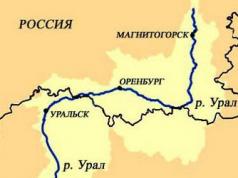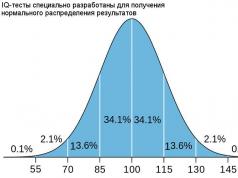Punctuation marks in a simple complicated sentence (homogeneous members of a sentence) and in a compound sentence
Punctuation marks with homogeneous members
Homogeneous members of a sentence- these are words that are the same member of the sentence, depend on the same word and answer the same question.
Homogeneous members in a sentence separated by a comma, if:
- there are no unions between homogeneous members. For example: Our path lies through Voronezh, Ryazan, Penza.
- there are repeating unions between homogeneous members: and ... and, or ... or, not that ... not that etc. For example: We collected clothes, books, and dishes.
- A comma is placed before the second part of the double union like..., so; not only but; not so much ... as; how much ..., so much; although ... but; if not ... then; not only not ... but; not that...but etc. For example: Before us appeared not only courageous warriors, but also beautiful Amazons.
Comma between homogeneous members not put in the following cases:
- there are single unions between homogeneous members and or yes(in meaning and). For example: Put on a coat or jacket.
- homogeneous members are a phraseological phrase with repeated unions. For example: and day and night, and laughter and sin, and here and there, neither this nor that, and this and that etc.
Homogeneous and heterogeneous definitions.
Homogeneous definitions, expressed by adjectives and participles and standing before the word being defined, are separated from each other by a comma, heterogeneous - are not separated. For example: Bestuzhev removed a green knitted glove from her hand.
Punctuation marks for homogeneous members with a generalizing word
Generalizing words- words that have a common meaning for all homogeneous.
- If the generalizing word is in front of homogeneous members, then a colon is placed between them. For example: Snow lay everywhere: on the roofs, on the benches, on the grass.
- If the generalizing word is after a number of homogeneous members, then a dash is placed between them. For example: In the theater, in the circus, in the cinema - everywhere I was bored.
- If the generalizing word is in front of homogeneous members, but then the sentence continues, then after a number of homogeneous members we put a dash. For example: All world capitals: London, Paris, Rome - have their sights.
- Decide with answers.
- Decide with answers.
- study
Task 16. Place punctuation marks: indicate all the numbers in the place of which commas should be in the sentence.
1. From a distance (1) he saw a house (2) unlike the others (3) built (4) by some Italian architect.
2. Above the boundless sea (3), which had not yet subsided (1) after the recent storm (2), the sky (4) humiliated (5) with bright twinkling stars rose.
3. A large pond (1) densely overgrown with water lilies (2) was located (3) in a part of the old park remote from the house (4).
4. Vladimir (1) waving a scythe without ceasing (2) cut grass (3) without showing (4) the slightest effort.
5. A cloud (1) hanging (2) over the high tops of poplars (3) was already pouring (4) with a drizzle.
6. Among the eccentrics (1) who lived in Moscow in Griboedov's times (2) was a man (3) described in the comedy "Woe from Wit" under the name (4) of Maxim Petrovich.
7. Having made our way (1) through a wet fern and some (2) creeping vegetation (3), we get out onto a barely noticeable path.
8. Anechka (2), lowering (1) her head, sat motionless in a downy scarf (3) carefully covering (4) her shoulders.
9. Ippolit Matveyevich (1) languishing in shame (2) stood under the acacia and (3) without looking at the walkers (4) repeated three memorized phrases.
10. Flipping through the pages (1) of the book (3) brought from the office (2), the father stopped at the ajar door (4) listening to the conversation in the kitchen.
11. Already in our time, researchers of the work of E.A.
12. Words (1) formed from geographical names (2) quite often put before the speaker and writer (3) questions (4) related to normative word usage.
13. Sparrow (1) suddenly taking off (2) disappeared into the bright greenery of the garden (3) transparently through (4) in the evening sky.
14. In bad weather, pines groan, and their branches (1) bent by gusts of an angry wind (2) crack (3) sometimes scratching (4) with needles on the bark of a tree.
15. Under the sun (1), competing with it (2), unusually tall, juicy and large-colored bathing suits (3) similar to yellow roses shone brightly.
16. Masha sat in the corner until lunch (1) carefully looking at her older sister and (2) listening to (3) her (4) words.
17. Immediately behind the river (1) rising up (2) one could see rocky mountains (3) outlined below (4) by a broken line of blackening low bushes.
18. Tall grass (1) leaning towards the ground (2) gently twisted around (3) rain-soaked (4) tree trunks.
19. The branches of trees (1) intertwined with hard frozen ends (2) sadly ring (3) experiencing (4) the winter cold.
20. Pushkin (1) brought up on the “History of the Russian State” by N. M. Karamzin (2) said about Russian history (3) his own word (4) that in many respects surpassed Karamzin's.
For this task you can get 2 points on the exam in 2019
Task 16 of the Unified State Examination in the Russian language suggests checking if you know how punctuation marks are placed in sentences where there are separate members. The latter can be definitions, applications, additions, explanations. This question of the test is considered one of the most difficult, and its successful solution requires extreme care, as well as knowledge of certain syntax rules.
In Russian written speech, isolations are always distinguished by commas, which are usually secondary members of a sentence. For example, it can be a participial turnover, and it can be both before and after the word being defined: “Amazed by the news, she slowly left. She, amazed by the news, slowly left. Task No. 16 of the Unified State Examination in the Russian language may also contain definitions after the word being defined. Commas in this case are placed if there are at least two of these definitions: “The child, full and content, fell asleep,” and if it is one, then commas are used only in conjunction with the pronoun: “He, well-fed, fell asleep. Satisfied, he fell asleep."
The participles, single or as part of participles, always have a comma next to them: "Having eaten, the child fell asleep."
Some set expressions always require commas for themselves: "Despite the rain, we are walking." In addition, a comparative turn is allocated with a comma, using unions “as, exactly, as if, as if, than, as if, than” and other similar ones. We also highlight additions with punctuation marks in task No. 16 of the Unified State Examination in the Russian language, especially if they are used with the prepositions “except, over, in addition to, except for, excluding, including, along with, instead of” - the so-called substitutions or exceptions. Examples of such a phrase are the sentences “No one but him answered the question correctly” or “Everyone, including me, goes to school.”
Task 16 USE 2015.
Option 1
- The headwind (1) that suddenly swooped down on us (2) doused everyone with waves (3) of herbs that had grown mad during the day (4).
2. Ostap (1), inspired by the beauties of the Caucasus (2), shouted something (3) trying (4) to overcome the roar and groans of the Terek.
3. The great strategist (1) with his hands in his pockets (2) walked along the side (3) without noticing Vorobyaninov, who remained on the shore (4).
4. The material (1) collected by the writer for work (2) is stored in notebooks (3) of particular artistic value.
5. Birds (1) occupying sheer cliffs (2) from top to bottom did not pay the slightest attention (3) to the boat passing below (4).
6. Ippolit Matveevich (1) mired in shame (2) stood under the acacia and (3) without looking at the walkers (4) repeated three memorized phrases.
7. Looking around the stage (1), Ippolit Matveyevich saw (2) rectangles hanging from the ceiling (3) (4) painted in the primary colors of the solar spectrum.
8. Having called (1) a short-haired (2) servant in a blue caftan (3), Vasily Ivanovich invited the guests to the house.
9. Tall grass (1) leaning towards the ground (2) gently twisted around (3) rain-soaked (4) tree trunks.
10.
Anechka (2), lowering (1) her head, sat motionless in a downy scarf (3) carefully covering (4) her shoulders.
11. We swept the snow off our boots with a broom (1) and (2) somewhat embarrassed (3) entered the house.
12. And the Christmas tree (1) flooded with lights (2) and illuminating everything around (Z) beckoned to pick (4) the flowers and fruits growing on it.
13. To sleep (1) despite the spring frosts (2) moved to the stable (3) closer (4) to the stallions.
14. Emphatically simple geometric shape of the "Black Square"
Malevich (1) not linked to any image or concept (2)
existing (3) in the world before it (4) testified to
absolute freedom of its creator
15. By evening, the fox lay down in a dense and high island of dry horse sorrel (1) and (2) curled up in a reddish-yellow lump near the dark red (3) densely seeded stems (4) patiently waited for the night.
16. But here (1) choosing the moment (2) the sergeant jumped to his feet with a jerk (3) and (4) shouting something (5) rushed head first over the rails (6) immediately disappearing on the other side of the single track.
17. The blizzard subsided (1) scattering with snow (2) through the forest (3) and (4) losing strength (5) whistling quieter (6) and quieter.
18. The clouds crawled slowly (1) then merging (2) then overtaking each other (3) their colors and shapes interfered (4) absorbing themselves (5) and reappearing in new outlines (6) majestic and gloomy.
19. The motley skin of a leopard (1) intercepted by a golden arrow (2) easily hung from a rounded shoulder to a curved hip (3) and (4) shimmering in the sun (5) showedbe a living being.
20. I (1) alarmed (2) and (3) upset to the core (4) sat silently (5) hoping for a favorable outcome.
Test on the topic "Punctuation marks in a simple sentence"
Task 16 USE 2015.
Option 2
16 . Place punctuation marks: enter all the numbers that should be replaced by commas in the sentence.
- Pleased with such favorable attention (1), the blacksmith already wanted to ask the queen a good question about everything (2) and moved closer (3) wanting to examine her little boots (4) and (5) to state his request.
- He angrily threw a cigarette butt (1) hissing in a puddle (2) put his hands in the pockets of his unbuttoned coat (3) and (4) bowing his head, which had not yet cleared up from pre-lunch lessons (5) and (6) feeling the weight of a bad dinner in his stomach (7 ) began to walk with concentration and energy.
- The contours of trees (1) splashed with rain (2) and (3) agitated by the wind (4) began to emerge from the darkness (5) blackening with splayed branches.
- Mother (1) who did not sleep at night for a minute (2) jumped out of bed (3) and (4) putting fire into the samovar (5) prepared in the evening (6) began to prepare breakfast.
- The foliage plucked from the trees (1) swirled in a whirlwind (2) and began to rise upwards (3) resembling a flock of multi-colored butterflies (4) flying to bright flowers.
- The moonlit (1) fog (2) spreading over the hollows and over the river (3) murmuring under the mountain (4) resembles some kind of fabulous creature.
- Mushroom pickers (1) frightened by the approaching thunderstorm (2) and the suddenly darkened sky (3) rushed to run (4) at breakneck speed.
- Dawn (1) lit by the rising sun (2) blazed (3) blazing with all shades of scarlet and yellow colors (4) and (5) illuminating everything around.
- Boys (2) were sitting by a river overgrown with thick bushes (1) talking quietly about something (3) and (4) watching the floats (5) weaving baskets of flexible wicker rods.
- The environmental movement (1) is gaining strength every year (2) and (3) steadily growing (4) unites adults and children (5) helping Russia to preserve its protected natural areas.
- Books (1) collected by high school students (2) and donated to kindergarten (3) made the little ones (4) very happy, who immediately began to look at bright pictures.
- The archaeologists settled down on the banks of the river (1), which quickly ran to the sea (2) and teeming with fish (3) and (4) setting up tents (5) went to excavations.
- Curving in a dark arc (1) and frightening with its gloomy appearance (2) stretched the forest (3) entangled with hops (4) littered with fallen trees (5) gloomy (6) and unsociable.
- Sparrows (1) scattered in flocks of roadside willows (2) shouted joyfully (3) and excitedly (4) telling everyone about the coming spring.
- It rang (1) swaying in the shade with columns (2) midges (3) burning the body with bites (4) and unbearably annoying.
- Lazily turned the mill wheel (1) blackened from time (2) collecting (3) sleepily murmuring water (5) into slowly substituted boxes (4) being afraid to drop an extra drop of precious moisture.
- Workers (1) brought from the city (2) worked (3) tirelessly (4) remembering the future generous reward.
- Masha (1), holding both ends of the wet steering rope (2) in one hand, lowered her other hand into the water (3) trying to pick (4) a water lily (5) swaying on the water.
- Seeing me at the icon painter (1) and (2) wanting to know the details of his little-known art (3), this sad dreamer (4) secluded in himself (5) was very happy.
- A large convoy of Russian peasants (1) was walking towards them, bringing provisions to Sevastopol (2) and now walking from there (3) filled with sick (4) and wounded soldiers in gray overcoats.
Answers
1 option | Option 2 |
|
1247 |
||
12456 |
||
To complete task 16 on the Unified State Examination in the Russian language, you need to remember the rules for separating definitions and circumstances, or, which sounds more familiar, place commas with participial and adverbial phrases. Remember that each task tests a certain range of your knowledge and skills, therefore, you put commas in place of the numbers, applying only the isolation rules, which are discussed below.
Task Formulation:
Place all punctuation marks: indicate the number(s) that should be replaced by a comma(s) in the sentence.
In task 16 you work with separate members of the proposal . Recall the rules for separating definitions and circumstances.
Separate definitions represented by participial phrases. (We have already addressed participles and participial phrases in tasks 7, 11, 12, 14, and you can see them in a sentence.)
Punctuation marks in participial turnover
- The participial turnover is separated by commas if it comes after the main (defined) word.
Book written by famous writer, aroused the interest of the reading public. Thunderstorm rangon the grass long awaited moisture and coolness. A place surrounded by vineyards it looked like a gazebo. Storks that arrived in the village, started making nests.
- The participial turnover is not separated by commas if it is before the main (defined) word.
Vineyard-covered place it looked like a cozy gazebo. Grass that has long been waiting for moisture and coolness straightened out after the rain. A book written by a famous writer aroused the interest of the reading public. Storks that arrived in the village started making nests.
- Single participles are not isolated.
- If the main word is a personal pronoun, the participle or participial turnover is separated by commas in any case.
Excited by the experiences of the past day, I could not sleep for a long time. Excited, he could not sleep for a long time. I, who have been wrong so many times, I wanted to trust people again. I am disappointed saw no point in continuing the journey.
Separate circumstances represented by gerunds and participles. (We have already met them in task 7, 10, 12.)
Punctuation marks for single participles and participles.
1. Single gerunds and participles are separated by commas, regardless of the place of the main word (verb-predicate).
She is, laughing walked towards me. Silent, he a few minutes remained motionless. And the stars listen me, joyfully playing with rays. Tired of waiting mother dozed off. The horses approached the fire and , looking with intelligent eyes, sighed.
2. The adverbial phrases that have turned into stable expressions are not isolated: sleeveless, without closing his eyes, holding his breath, etc. Schoolchildren rushed along the corridor headlong. Nothing to sit with folded hands.
What should you pay attention to?
The sentence may contain homogeneous isolated definitions (expressed by the participial turnover) or circumstances (expressed by the adverbial turnover) connected by the union And. In this case, the comma between the revolutions (before And) is not put.
Let's do the task:
In silence, the bees crawled sleepily through the flowers by the balcony (1) making their
unhurried work (2) and heard (3) a barely perceptible (4) babble of the silvery foliage of poplars.
crawled(how? ), doing its slow work,- adverbial turnover is isolated;
Babble (what?) barely perceptible- the participial turnover is not isolated, since in the sentence it stands before the main (defined) word.








